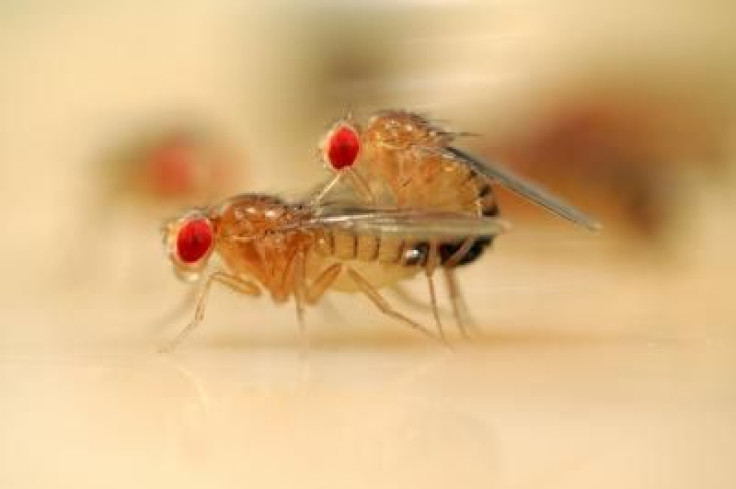Why Do Humans Have Sex? Fruit Flies May Offer Clues About Our Own Mating Decisions

The reasons humans decide to have sex with a particular person are varied and mysterious. Sure, it’s got something to do with looks and emotions and all that, but what about the subconscious brain stuff that happens? What about pheromones and electrical impulses?
To answer those questions, scientists are turning to simpler, tinier test subjects: fruit flies. While the impulses driving male flies to seek sex are well understood, the impulses compelling females to allow or deny it is mostly unknown. (Sound familiar?) Three new research papers published Wednesday, however, offer clear new insights into the mind of a lady fly.
When a male has a female in his sights, he tries to woo her the only way he knows how, by singing. As you’d expect, the female either thinks he’s cute or pathetic. If she decides she wants to copulate, she does two things: She stops moving and opens something called her vaginal plates. “Very little is known about how the female evaluates male courtship to decide whether to mate and how she executes that decision,” writes Jennifer J. Bussell, of the Rockefeller University in New York, and her colleagues in their paper in Current Biology.
To find out more, scientists have been looking at the neural pathways that fire when female flies are ready to go. Bussell’s paper examines a set of neurons called Abdominal-B neurons. While testing virgin flies, they spotted a key phenomenon. When those neurons are inactive, the female does not stop moving. But when they synthetically turned on the Abdominal-Bs, the females stopped dead in their tracks. “Pausing to interact with a male,” Bussell said in a news release, “rather than avoiding him, is a crucial step in any female’s behavior leading to copulation.”
But what’s the root cause of stopping? Why does she want him in the first place? Another paper published in Neuron, claims to push our understanding a step further by narrowing the groups of brain cells that have something to do with why she likes one fly’s song and not another’s. The researchers say they’ve proven that the neurons driving male mating behavior are different from the ones related to female mating behavior.
A third paper, also published in Neuron, sought to learn more about what happens the day after. In fact, for about 10 days after a female has sex, she’s reluctant to have sex again. Scientists have traced that effect to something called the sex peptide. It’s a protein that male flies transfer with their sperm into the female. In the new research, scientists say they’ve discovered that the protein triggers a part of the female brain similar to the hypothalamus in humans, responsible for hormone production, including sex drive.
Scientists are unclear about the extent to which you can extrapolate fruit fly behavior to human behavior. But they’re convinced that knowing more about these bugs’ brains can eventually shed light on our own. "An understanding of the neural mechanisms underlying how sensory information elicits appropriate sexual behaviors can be used as a point of comparison for how similar sexual behavior circuits are structured and function in other species," said Bruce Baker, lead author of the fly song study.
Sources:
Feng et al. Ascending SAG Neurons Control Sexual Receptivity of Drosophila Females. Neuron. 2014.
Zhou et al. Central Brain Neurons Expressing doublesex Regulate Female Receptivity in Drosophila. Neuron. 2014.
Bussell et al. Abdominal-B Neurons Control Drosophila Virgin Female Receptivity. Current Biology. 2014.



























